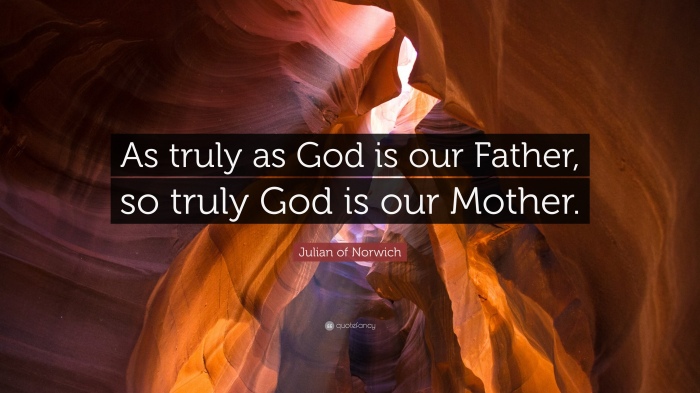 On a number of occasions I have engaged in conversations, or heard podcasts (I’m thinking here of the October 17, 2017 of The Liturgists Podcast on “God Our Mother”), or read articles (or quotes like the one pictured here of Julian of Norwich) by those who contend for broader language in regard to what we might properly call our deity within the Church. Some have contended that the NT language of “Father” is more a construct of cultural embeddedness related to a bygone era that needs this metaphor to be expanded to any number of other possibilities, such as “Mother” that would be more appropriately inclusive and thus representative of the non-gendered deity we claim to worship.
On a number of occasions I have engaged in conversations, or heard podcasts (I’m thinking here of the October 17, 2017 of The Liturgists Podcast on “God Our Mother”), or read articles (or quotes like the one pictured here of Julian of Norwich) by those who contend for broader language in regard to what we might properly call our deity within the Church. Some have contended that the NT language of “Father” is more a construct of cultural embeddedness related to a bygone era that needs this metaphor to be expanded to any number of other possibilities, such as “Mother” that would be more appropriately inclusive and thus representative of the non-gendered deity we claim to worship.
This is an abstracted illusion as it fails to appreciate the very context from which we (the Church) have inherited our language of addressing the divine: Israel and the Lord Jesus Christ.
Christopher Seitz has a helpful chapter engaging this very subject in Word Without End: The Old Testament as Abiding Theological Witness (Baylor University Press, 2004), pp. 251-262. I include his closing paragraph as giving voice to my own reading of this issue (p. 262):
To call God “mother” or “she” would be to call attention to God as truly gendered, simply by the fact that such language means to serve as a replacement for or improvement on the biblically grounded language has the capacity to transcend this framework of discussion, because it emerges as a testimony to God’s own name and initiative in revealing it, rather than because it conforms to metaphors whose fitness is determined by human debate or divine defense. To defend God as “father” by appeal to suitability of metaphor would in fact undo the logic with which the language emerged in the first place, which is riveted to Israel’s particular experience of God’s revelation and, through the work of Christ, its extension at Pentecost to all nations and peoples. “Father, Son, and Holy Spirit” emerges from a particular story. Our use of this language preserves that particular story and the God who brought it and us into being, making us his people and allowing us to be faithful witnesses who call upon his name, for our own sakes and for the sake of his creation.
We have not constructed our language for the divine, but have received it and do well to faithfully pass this story along in our invocation of the Name. To do otherwise, is to abstract “God” from the story of Israel and God’s self-revelation in and through Jesus as Father, Son, and Holy Spirit.
How we confess God is a matter of faithfulness to that self-revelation and not a matter of cultural speculation and debate. While metaphors for the divine abound in Scripture (including those which are feminine or motherly) we do well to take up the language of God’s self-giving in prayer and praise, and we refuse the very specificity of God’s self-revelation to do otherwise.
